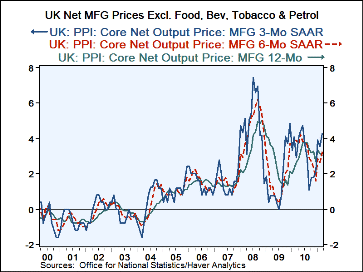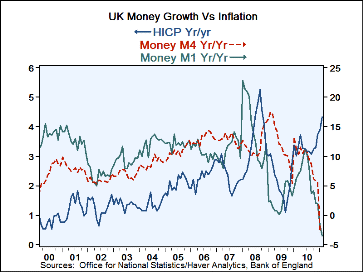 Global| Apr 08 2011
Global| Apr 08 2011BOE Plays Doubting Thomas to Resurrected Inflation
Summary
While the ECB is hiking rates on marginal inflation risks as the BOE is holding back while inflation rages- at least at the PPI level. At the same time the CPI is hardly to be construed as tame as its twelve month pace is 3.3% and its [...]
 While the ECB is hiking rates on marginal inflation risks as the BOE is holding back while inflation rages- at least at the PPI level.
At the same time the CPI is hardly to be construed as tame as its twelve month pace is 3.3% and its compounded three month
pace is a hearty 4.7%.
While the ECB is hiking rates on marginal inflation risks as the BOE is holding back while inflation rages- at least at the PPI level.
At the same time the CPI is hardly to be construed as tame as its twelve month pace is 3.3% and its compounded three month
pace is a hearty 4.7%.
Still, at the end of the day it is the ECB that has hiked rates and the BOE that has not. What is the difference? Prayer? Hope? Underlying economic conditions? Different policy weights?
I think it's a bit of all these things. The ECB with a heavy German influence places a greater weight on price stability and has less tolerance for overshoots even at low inflation levels. Structural conditions are different too but they should lead the BOE to be tighter and the ECB to be looser. The BOE has been too willing to hope and pray that inflation would not continue to soar but oil prices have continued to higher levels obtained sooner than just about anybody thought helped also by certain unpredictable world events. We can't really 'blame' the BOE for that. But one foot down that path led to another and now it has a new situation with both inflation and inflation expectations well entrenched exactly the sort of thing that the ECB has been hell-bent to avoid. Our policy mix would have been better if the ECB had run BOE policy and had the BOE run ECB policy- but things don't work that way.
The dynamics here are complicated because while the BOE appears to be doing nothing as inflation overshoots its mark (fiddling while Rome burns), it is fact doing something. M4 money supply growth is at -2.8% over 12months and is falling at a 4.5% annualized pace over three months. It may be that the BOE sees inflation as succumbing to the Wile E Coyote Syndrome. This is a syndrome well-known to cartoon watchers in the US in which Wile E. speeds off the edge of the mesa while chasing the more nimble Road Runner. When Wile E. cannot brake fast enough he is left hanging in mid-air, literally, where he hovers for a few seconds giving him no traction to return to the mesa but time to ponder his fate as his circumstance interacts with gravity and nature takes its course. So is UK inflation having a 'last hurrah' of sorts and is it about to curl up into a fetal position and go away, once it realizes it has no monetary fuel?
 As a
monetary strategy the BOE may be right. But it is now on what we call the downside of what US policy is trying to avoid.
For whatever reason(s) UK inflation is elevated. It is elevated in the headline, in the core, at the PPI level, for the CPI
and is being further stoked by rising Brent oil prices and gains by other commodities. This puts the inflation dynamic in a
different sort of space. It's a bit like a runner who should collapse finding a shot of adrenaline to help him push ahead when he
should fall short.
As a
monetary strategy the BOE may be right. But it is now on what we call the downside of what US policy is trying to avoid.
For whatever reason(s) UK inflation is elevated. It is elevated in the headline, in the core, at the PPI level, for the CPI
and is being further stoked by rising Brent oil prices and gains by other commodities. This puts the inflation dynamic in a
different sort of space. It's a bit like a runner who should collapse finding a shot of adrenaline to help him push ahead when he
should fall short.
It may be that inflation is malnourished by money growth and cannot endure. But with inflation so clear and ever-present expectations have now got the bit in their teeth and will not let go. This means that the harsh reality of monetary medicine (or slow starvation, in this case) may have to become a more severe dose in order to drive its message home.
The one thing that seems unlikely to me is that absent a sharp turnabout in the level of oil prices that the UK will be able to exit its circumstance without falling into recession. It has come a step too far. It has seen the fork in the road and decided not to take it. It has bet that 'this' is temporary then that 'that' is temporary and surely those judgments were correct... but sometimes 'temporary' is a long time. It is perhaps with a feeling of horror that the BOE is now confronting that reality.
The chart above shows the CPI headline inflation is in a surge upward departing markedly from the plunge in (various) money growth rates. UK economic data have continued to be unpredictable with some recent hot/cold indicators. Of course we know that mixed signals are the product of business cycle turning points. Is that what we are experiencing here? In economics it is always hard to tell. Recessions are only identified after the fact and usually by events that give the recession its signature weakness months into the process, not at the start. The start of a recession is usually a slip that later turns to a plunge. In some way UK momentum still seems to be pretty solid and its LEI, released just today, continues to point to expansion. But with an economy so torn between plunging money growth and soaring inflation it is hard to see how this tug of war gets resolved amicably. It is the monetary equivalent of the Hatfield and McCoy dispute, or if you prefer Capulet Vs Montague - bad endings, both. Can the link between money and inflation be res-established given those two opposite and severely sloped vectors without a bad outcome? Maybe- and people do win the lottery and card players do draw to insides straights. But these outcomes are long shots - so is a UK soft landing.
| UK PPI MFG Net Output Prices | |||||||
|---|---|---|---|---|---|---|---|
| %M/M | %SAAR | ||||||
| Mar-11 | Feb-11 | Jan-11 | 3Mo | 6Mo | 12Mo | 12Mo Yr Ago |
|
| MFG | 0.7% | 0.7% | 1.1% | 10.0% | 9.0% | 5.5% | 4.5% |
| Core | 0.3% | 0.1% | 0.7% | 4.3% | 3.2% | 3.0% | 2.7% |
| Brent | 10.5% | 5.6% | 6.1% | 134.4% | 110.2% | 44.3% | 68.7% |
| Core: ex food beverages, tobacco & Petroleum | |||||||
Robert Brusca
AuthorMore in Author Profile »Robert A. Brusca is Chief Economist of Fact and Opinion Economics, a consulting firm he founded in Manhattan. He has been an economist on Wall Street for over 25 years. He has visited central banking and large institutional clients in over 30 countries in his career as an economist. Mr. Brusca was a Divisional Research Chief at the Federal Reserve Bank of NY (Chief of the International Financial markets Division), a Fed Watcher at Irving Trust and Chief Economist at Nikko Securities International. He is widely quoted and appears in various media. Mr. Brusca holds an MA and Ph.D. in economics from Michigan State University and a BA in Economics from the University of Michigan. His research pursues his strong interests in non aligned policy economics as well as international economics. FAO Economics’ research targets investors to assist them in making better investment decisions in stocks, bonds and in a variety of international assets. The company does not manage money and has no conflicts in giving economic advice.






